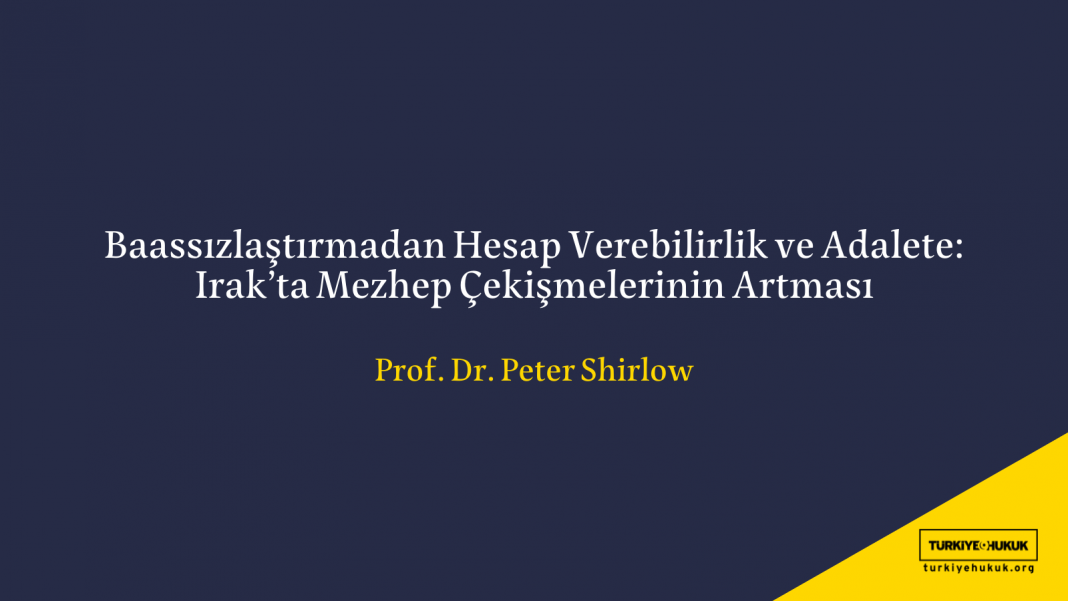Prof. Dr. Peter Shirlow / Queen’s Üniversitesi
İnsan hakları ihlalleri ve diğer ihlallere müdahale eden geçiş toplumlarında, toplumun kamu görevi yoluyla yeniden inşasında kimin görev alacağının belirlenmesi daimi bir sorundur. Bu, kamu görevlerine gelecek veya o görevlerde kalacak olanların insan hakları ihlallerine karışıp karışmadıklarına dair muayeneden geçtikleri bir arındırma biçimini alabilir. Oysa Irak’ta girişilen tasfiye işlemi ‘insanların bireysel sorumlulukları değil, bir gruba üyelikleri ya da o grupla olan bağlantıları nedeniyle’ (Duthie, s.18) görevden alınmalarıyla ilişkilidir. Şüphesiz geçiş dönemi adaleti hem geçmişin hem de geleceğin muhasebesini yaparak kamu görevini yeniden şekillendirmeyi amaçlamalıdır. Bu da standart olarak bütünlük, insan hakları gelişimi, medeni hısımlık ve medeni standartlar gibi temalara büründürülür.
Baas Partisi kıdemli üyeliğiyle bağlantılı olduğu iddia edilen Irak’taki tasfiye işlemlerinin, ‘temel değerleri’ ihlal etmiş olan ‘haksız’ amilleri ortadan kaldıran ahlaki bir projeye bağlı bir uzlaştırma politikası olduğu farz ediliyordu. Parti üyeliğinin gerçekleri, üyeliğin çetrefillikleri ve kişilerin bu tür ortaklıkları kabul etmeye gözdağı yoluyla ikna edilmiş olduğu, Baassızlaştırma sürecinde hiç doğru dürüst açıklanmadı. Ayrıca, üyeliğin geçici ve heterojen olduğu ve geçmiş davranışların hiçbir doğrudan insan hakları ihlaliyle bağlantılı olmadığı fikri zaman zaman kasıtlı olarak göz ardı edildi. Baassızlaştırma sürecinin başında ‘ahlak’ ne toplumsal inşa ürünü olarak yorumlandı ne de uzlaştırma için gerekli bir medeni yeniden-birleştirme stratejisi olarak tanımlandı.
From De-Ba’athification to Accountability and Justice: The Rise of Sectarian Contestation in Iraq
Prof. Dr. Peter Shirlow
Queen’s University
In transitional societies which respond to human rights and other abuses there is the perennial problem of determining who shall participate in the re-construction of society through public office. This may take the form of lustration within which those who will or continue to hold public positions are vetted with regard to their involvement in human rights abuses. Whereas purging, as undertaken in Iraq, relates to removing ‘people for their membership in or affiliation with a group rather than their individual responsibility…’ (Duthie, p.18).Without doubt transitional justice must aim to reconfigure public office through examining both the past and the future. This is normatively dressed in the themes of integrity, human rights development, civic propinquity and civic standards.
Purging in Iraq, supposedly linked to ranked membership of the Ba’ath Party, was imagined as a policy of reconciliation tied to a moral project that removed ‘unjust’ agents who had violated ‘fundamental values’. The realities of party membership, the complexities of that membership and the fact that persons were intimated into taking up such associations were never properly defined in the process of de-Ba’athifciation. Moreover, the idea that membership was fluid and heterogeneous and that past behaviour was not necessarily linked to any direct human rights violations has at times been purposefully ignored. In beginning the process of de-Ba’athification ‘morality’ was not interpreted as social construction nor was it defined as a strategy of civic re-incorporation required for reconciliation.
*Bu tebliğ, 23-24 Mayıs 2013 tarihinde gerçekleştirilen Uluslararası Irak Sempozyumu’nun 1. gün 3. oturumunda sunulmuştur.





